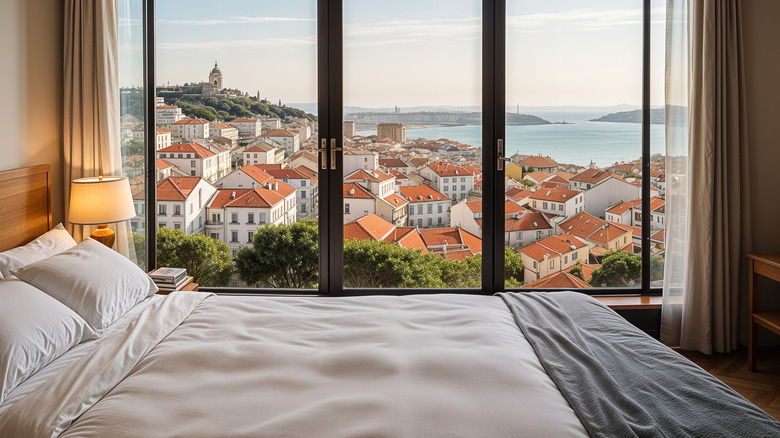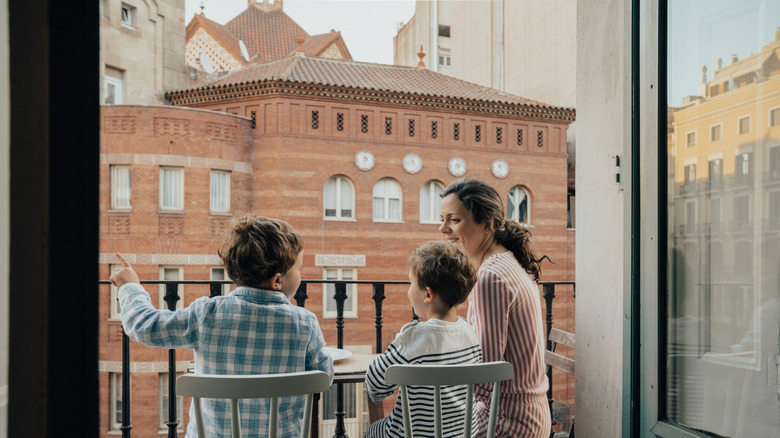The Crucial Travel Splurge Rick Steves Swears By To Save Time And Elevate Your Entire Trip
Rick Steves is a world-renowned travel expert, and with good reason: His resume is truly impressive. His extensive travel experience has led him to publish dozens of books, articles, podcasts, and even TV shows, mostly about his travels in Europe. He's covered where to go, what to do, what to eat, and even some historical background on different places around the world, so it's easy to see why hundreds of people planning their European trips rely on his guidance.
Steves has a general travel philosophy for every trip, which has been established over many years. This includes pursuing budget-friendly (not quite shoestring) experiences, designed to make your trip possible from a financial perspective and get the most bang for your buck. However, there are a few things Rick Steves considers worthy of splurging on for the best trip to Europe. As he writes on his website, "My feeling has long been that you experience more by spending less. While that's still true, over the years, I've realized that you can also justify splurges as good values when you consider the experience gained and the time saved."
The main thing that is worth splurging on, according to Steves, is your accommodation. Primarily, the location of said accommodation. Rick Steves says that staying in a centrally located hotel is worth it, even if the price is extra. He wrote, "I'm always willing to pay a bit more for the convenience of a centrally located hotel, close to the sights. And in the oldest parts of Europe, many of these well-situated hotels come with enough history to themselves be part of the itinerary."
Why you should choose a centrally-located hotel or rental
There are a couple of reasons that staying in a central hotel is one of Rick Steves' top-tier travel tips. Although there may be a higher upfront cost, staying in a centrally-located hotel can save you both money and time, especially regarding transportation costs. Those can add up quickly, and so can the time you spend riding or waiting for the train or bus. So staying central can actually be time-saving and more cost-effective than staying outside of the city, with or without an impossibly deep discount. Plus, nothing beats the immersive experience of staying in the center of Rome, Sydney, Tokyo, Warsaw, or any city you choose. Luckily, even the most expensive cities usually have a few mid-range hotel options in (or at least near) the center, so staying centrally without going bankrupt is possible.
Staying in a centrally located hotel is also a brilliant idea when you're traveling with children. If you're staying somewhere with a view or a balcony, then you can feel like you're experiencing the sights without actually leaving your room, when you find yourself nap-trapped or in need of some downtime. Travel is tiring for tiny kids –– and especially for adults traveling with tiny kids!
Other tips for choosing a hotel while traveling abroad
There are well-known red flags to look for when booking a hotel, including terrible reviews, distorted pictures, strange payment options, little or no communication, and shockingly low prices. Pro tip: Unless it's a hostel where you're sharing a bunk and a bathroom, a room significantly lower than the area's average is probably too good to be true.
To find the best hotel, inn, or vacation rental, naturally, Rick Steves has a few other tips besides looking for something centrally located and reasonably priced. As he says on his blog, "I look for places that are clean, central, relatively quiet at night, reasonably priced, friendly, small enough to have a hands-on owner and stable staff, run with a respect for local traditions, and not listed in other guidebooks. If I can find a place with, say, six of these eight criteria, it's a keeper."
Check the reviews, but take them with a grain of salt, especially when it comes to ratings. A decent hotel can have its score lowered by one disgruntled customer who didn't have their requisite towels. Similarly, a hotel's reviews can skew higher than it might deserve if, say, a patron finds a snake in their bed and still rates it four out of five stars. Other things to take note of when choosing your accommodation include the offered amenities (like Wi-Fi or parking), cancellation policy, safety measures, transportation options, and sustainability practices. If these aren't easily accessible on the website, that's a red flag.


